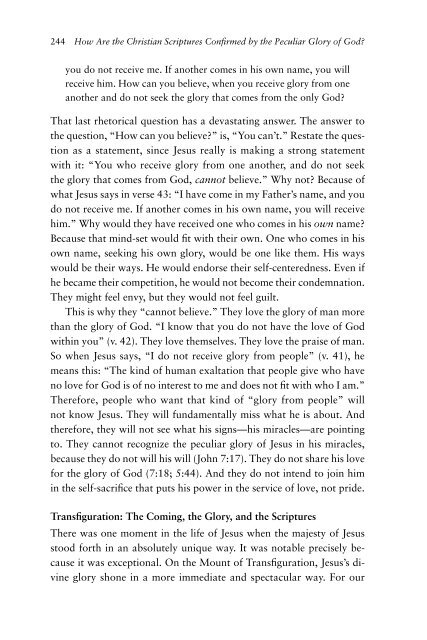Scriptures selfattesting authority question doctrine truthfulness Scriptures
peculiar-glory-en
peculiar-glory-en
You also want an ePaper? Increase the reach of your titles
YUMPU automatically turns print PDFs into web optimized ePapers that Google loves.
244 How Are the Christian <strong>Scriptures</strong> Confirmed by the Peculiar Glory of God?<br />
you do not receive me. If another comes in his own name, you will<br />
receive him. How can you believe, when you receive glory from one<br />
another and do not seek the glory that comes from the only God?<br />
That last rhetorical <strong>question</strong> has a devastating answer. The answer to<br />
the <strong>question</strong>, “How can you believe?” is, “You can’t.” Restate the <strong>question</strong><br />
as a statement, since Jesus really is making a strong statement<br />
with it: “You who receive glory from one another, and do not seek<br />
the glory that comes from God, cannot believe.” Why not? Because of<br />
what Jesus says in verse 43: “I have come in my Father’s name, and you<br />
do not receive me. If another comes in his own name, you will receive<br />
him.” Why would they have received one who comes in his own name?<br />
Because that mind-set would fit with their own. One who comes in his<br />
own name, seeking his own glory, would be one like them. His ways<br />
would be their ways. He would endorse their self-centeredness. Even if<br />
he became their competition, he would not become their condemnation.<br />
They might feel envy, but they would not feel guilt.<br />
This is why they “cannot believe.” They love the glory of man more<br />
than the glory of God. “I know that you do not have the love of God<br />
within you” (v. 42). They love themselves. They love the praise of man.<br />
So when Jesus says, “I do not receive glory from people” (v. 41), he<br />
means this: “The kind of human exaltation that people give who have<br />
no love for God is of no interest to me and does not fit with who I am.”<br />
Therefore, people who want that kind of “glory from people” will<br />
not know Jesus. They will fundamentally miss what he is about. And<br />
therefore, they will not see what his signs—his miracles—are pointing<br />
to. They cannot recognize the peculiar glory of Jesus in his miracles,<br />
because they do not will his will (John 7:17). They do not share his love<br />
for the glory of God (7:18; 5:44). And they do not intend to join him<br />
in the self-sacrifice that puts his power in the service of love, not pride.<br />
Transfiguration: The Coming, the Glory, and the <strong>Scriptures</strong><br />
There was one moment in the life of Jesus when the majesty of Jesus<br />
stood forth in an absolutely unique way. It was notable precisely because<br />
it was exceptional. On the Mount of Transfiguration, Jesus’s divine<br />
glory shone in a more immediate and spectacular way. For our


